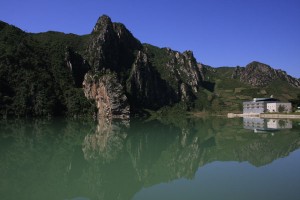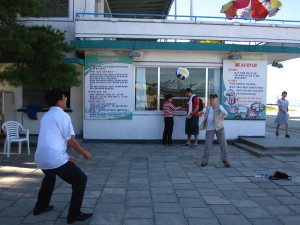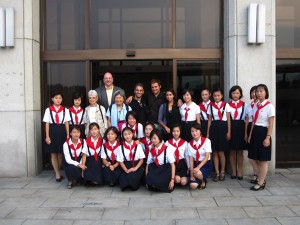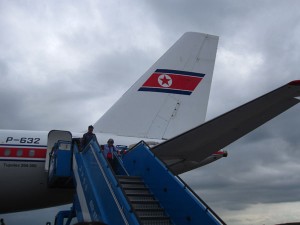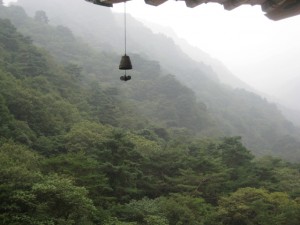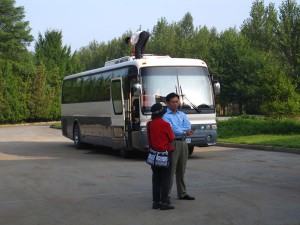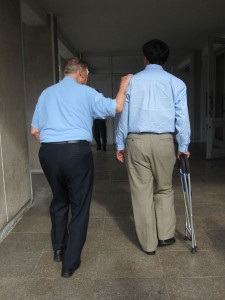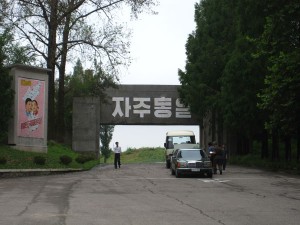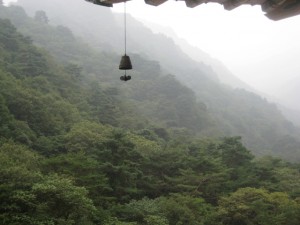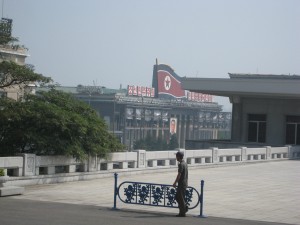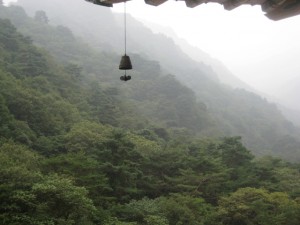The following is the third installment in a 4-part series written by Sophia Michelen, a Global Exchange Reality Tours participant who was on the delegation to North Korea last September 2010. In this series, she reflects on her experiences in North Korea.
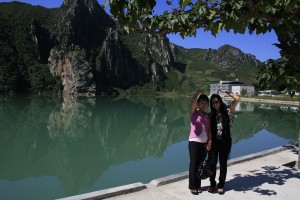 “A Rare Flower” by Sophia Michelen
“A Rare Flower” by Sophia Michelen
—–
One lone female college graduate, on a plane to Beijing, then another to Pyongyang, meeting a group of passionate travelers, where the closest female companion was several decades my elder.
That was me.
I did not expect to take my North Korea adventure as a sort of high-school chaperoned trip, but I did imagine that there would be a fairly high chance of meeting another young female professional in the group. I know plenty of adventure-loving females, so why would this trip be any different? There just had to be someone who would be on the trip that I would be able to have age-appropriate discussions and conversations with.
I absolutely cherished the individuals traveling with me to North Korea. However, I found it a bit peculiar that there were no other female 20-somethings jumping at the opportunity. Nonetheless, my gypsy-like travel routine did not make me dependent on a travel buddy.
The night before departing for Pyongyang, our American-South Korean travel guide who would accompany us for the remainder of the trip, briefed us regarding our North Korea schedule and our tour guides. We would have two male guides and a male bus driver. This gendered specification was not surprising, for we were told that it is they, the males, who are most educated in the society – they who are given the opportunity to leave the country, visit Europe, pick up a degree or two, and learn second and third languages fluently [one of the two male tour guides would even be conversing with me in French!]. Our South Korea tour guide, after dinner, pulled me aside asking me why a young female like myself would be so drawn to visiting North Korea. I explained my decade-long curiosity and former Korean language tutorial; and how it felt the time was right for the trip. He happily listened and eagerly told me that on this trip, on a rare occasion, we would be having another tour guide – a young female guide, training to become a senior guide, and, best of all, that she was my age! I would never have guessed that the travel companion I so sought for would be a North Korean – a perfect cultural insider.
Once we landed in North Korea, our guides were waiting for us to pass custom. As normal for travelers visiting the country, they took our passports and mobile phones. Ms. Lee, the lone female guide, greeted us with a friendly smile, comported properly but seemingly excited by the prospect of showing a group of foreigners her country. “We have a lot to show you,” she would say. Getting on the bus, introductions were not lagging. Our South Korea guide said loud and proudly – “Ms. Lee, this is Sophia – you can practice your English with her and you can teach her North Korean culture. She is your age!” We laughed, and that’s where we began.
At our first stop, the Arch of Triumph, Ms. Lee and I conversed naturally, talking initially about the basics– place of birth, family, siblings, schooling, why I came to North Korea, why she became a tour guide. Language was also a topic of conversation – how and where I learned some Korean and why she decided to learn English. She proudly mentioned her previous travels – just a couple countries outside of North Korea, including China.
Moving throughout the sites and meals of our itinerary, Ms. Lee would respectfully sit with the elder guides. We would continuously invite her to sit with us, but politely she refused. But later in the trip she would warm up and she would be like our own private North Korea Wikipedia site. I would start by asking specific questions regarding our current location, before quickly diverging into other questions on my mind– from instruments [she plays the accordion], to friends, social events, TV shows, music [no she hadn’t heard of Lady Gaga],and growing up in North Korea. I was thirsty to know more about her insider’s perspective out of the world from North Korea, despite already knowing how the outside world may view her country.
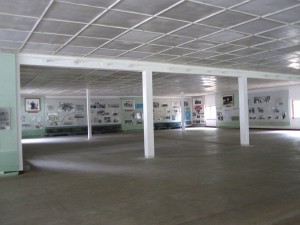 My questions and these conversations lasted until the bus ride to the airport for our departure flight. However, my most memorable moment was at the demilitarized zone. We visited the old, very desolate and empty meeting room where delegations from both our countries met decades ago to sign the 1953 Armistice. Even the air smelled old. Everything was left intact – except for the Plexiglas casing over the table-top flags during the singing. Other than that, everything was original – original table, chairs, even the turf-like, green table covering was there. I must say I was surprised that these historic artifacts were not better kept or in a more “hands-off” environment, but passionate about original experiences, I treasured being able to interact with these objects in such a way.
My questions and these conversations lasted until the bus ride to the airport for our departure flight. However, my most memorable moment was at the demilitarized zone. We visited the old, very desolate and empty meeting room where delegations from both our countries met decades ago to sign the 1953 Armistice. Even the air smelled old. Everything was left intact – except for the Plexiglas casing over the table-top flags during the singing. Other than that, everything was original – original table, chairs, even the turf-like, green table covering was there. I must say I was surprised that these historic artifacts were not better kept or in a more “hands-off” environment, but passionate about original experiences, I treasured being able to interact with these objects in such a way.
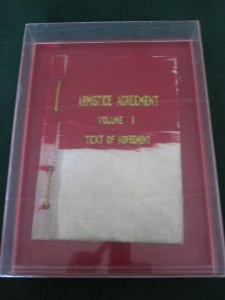 As we walked around the zone together), Ms. Lee and I linked elbows and discussed potential change for our countries’ political relationship. Here we were, two citizens, females at that, with our country still technically at war with one another, having a peaceful conversation about future changes – near and distant- for our generation. She discussed how she longed to see the peninsula reunified – where both her people (North and South) would be able to merge again as one, learn from each other and be reunited with lost family. She still desires and hopes to travel abroad, and have some freedoms like her American counterparts while still keeping her strong and proud Korean identity. Not once did she insult or discriminate my country – not once did she impose any of her potential negative views of the States. We both know what is said about the others’ country, but there was no need to rehash the obvious.
As we walked around the zone together), Ms. Lee and I linked elbows and discussed potential change for our countries’ political relationship. Here we were, two citizens, females at that, with our country still technically at war with one another, having a peaceful conversation about future changes – near and distant- for our generation. She discussed how she longed to see the peninsula reunified – where both her people (North and South) would be able to merge again as one, learn from each other and be reunited with lost family. She still desires and hopes to travel abroad, and have some freedoms like her American counterparts while still keeping her strong and proud Korean identity. Not once did she insult or discriminate my country – not once did she impose any of her potential negative views of the States. We both know what is said about the others’ country, but there was no need to rehash the obvious.
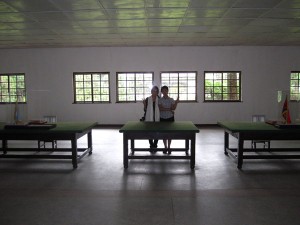 At this point in our small walking tour, Ms. Lee and I find ourselves standing behind the actual table where the treaty was signed. We were so busy chatting; we barely realized the flow of the group. As we rushed for a photo-op before the next site in the zone, I paused to appreciate the moment – the rarity of these two individuals, from these two countries, discussing these topics, in this location. As Ms. Lee scurried to the bus, I walked behind the others, took my time, taking in the color of the grounds – a white and violet-petal, growing on a single flower amongst the overgrown grass. So peacefully swaying, I looked and smiled to myself, grateful for the moment. For the unique ability to experience this instant and the conversation I had just had with Ms.Lee. Just like the rarity of the flower amongst the weeds, the symbol of this small flower growing in the tensest boarder on earth reminded me of the unique moment with Ms. Lee, my friend, my peaceful North Korean companion, the fellow female counterpart I imagined having on the journey.
At this point in our small walking tour, Ms. Lee and I find ourselves standing behind the actual table where the treaty was signed. We were so busy chatting; we barely realized the flow of the group. As we rushed for a photo-op before the next site in the zone, I paused to appreciate the moment – the rarity of these two individuals, from these two countries, discussing these topics, in this location. As Ms. Lee scurried to the bus, I walked behind the others, took my time, taking in the color of the grounds – a white and violet-petal, growing on a single flower amongst the overgrown grass. So peacefully swaying, I looked and smiled to myself, grateful for the moment. For the unique ability to experience this instant and the conversation I had just had with Ms.Lee. Just like the rarity of the flower amongst the weeds, the symbol of this small flower growing in the tensest boarder on earth reminded me of the unique moment with Ms. Lee, my friend, my peaceful North Korean companion, the fellow female counterpart I imagined having on the journey.
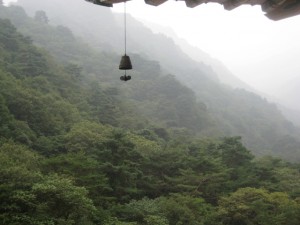 Join the Next Delegation to North Korea!
Join the Next Delegation to North Korea!
Come back here tomorrow to read the next installment in this 4-part series.
Interested in traveling to North Korea? We have a Reality Tour delegation coming up at the end of August, and other trips planned after that. Find out the details here.
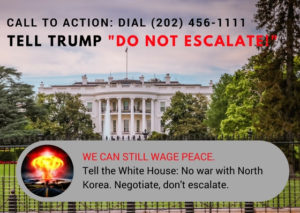 As tempers flare and tensions rise rapidly with North Korea, we wanted to give some resources on allies who are working to de-escalate what is a dangerous situation. Here is how you can get involved:
As tempers flare and tensions rise rapidly with North Korea, we wanted to give some resources on allies who are working to de-escalate what is a dangerous situation. Here is how you can get involved:
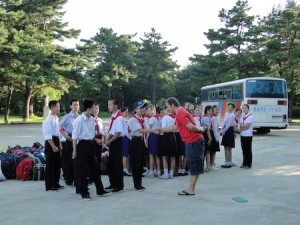 The following was written by Jeremy Jimenez, who traveled on a Global Exchange
The following was written by Jeremy Jimenez, who traveled on a Global Exchange 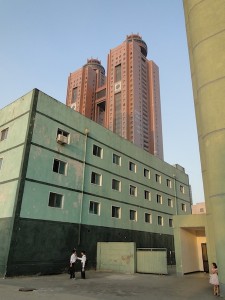 Another interesting observation I couldn’t help but notice is how traditional the society is both with regard to gender stratification as well as the classic Confucion respect for the elderly, no doubt a result of the country’s isolation from the norms of globalization brought by mass media and the lack of opportunities to interact regularly with foreigners. Regarding the latter, I particularly recall when a soldier guiding us to a lookout point at the DMZ was quite impressed and insisted we applaud a fellow 83 year old traveler who was able to climb the steep hill without assistance. Regarding the former, I recall our GX guide Alessandro at a rest stop requesting to drink strawberry milk, but was given coffee instead saying that the strawberry drink is only for girls. Similarly, when I accidentally dropped my shirt in the mud and inquired if there was a nearby sink I could use to wash off the mud, my guide Ms. Kim adamantly insisted I let her clean it because “men are not supposed to wash clothes.” Lastly, when I jokingly wanted my ability to distinguish male from female sculptures of dragons recognized by our guide, he replied that if I was so good at distinguishing the two, I wouldn’t have let a tattoo artist make a female dragon turtle on my leg (though when I explain this is just reflecting a harmonious Yin Yang balance, he mutters something along the line of “touché”.)
Another interesting observation I couldn’t help but notice is how traditional the society is both with regard to gender stratification as well as the classic Confucion respect for the elderly, no doubt a result of the country’s isolation from the norms of globalization brought by mass media and the lack of opportunities to interact regularly with foreigners. Regarding the latter, I particularly recall when a soldier guiding us to a lookout point at the DMZ was quite impressed and insisted we applaud a fellow 83 year old traveler who was able to climb the steep hill without assistance. Regarding the former, I recall our GX guide Alessandro at a rest stop requesting to drink strawberry milk, but was given coffee instead saying that the strawberry drink is only for girls. Similarly, when I accidentally dropped my shirt in the mud and inquired if there was a nearby sink I could use to wash off the mud, my guide Ms. Kim adamantly insisted I let her clean it because “men are not supposed to wash clothes.” Lastly, when I jokingly wanted my ability to distinguish male from female sculptures of dragons recognized by our guide, he replied that if I was so good at distinguishing the two, I wouldn’t have let a tattoo artist make a female dragon turtle on my leg (though when I explain this is just reflecting a harmonious Yin Yang balance, he mutters something along the line of “touché”.)